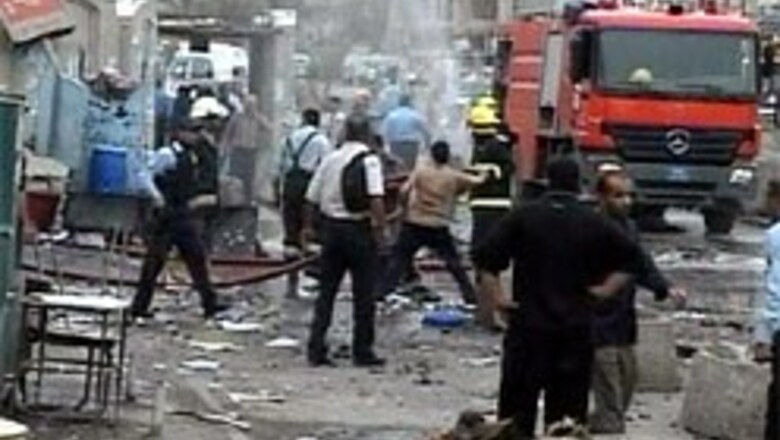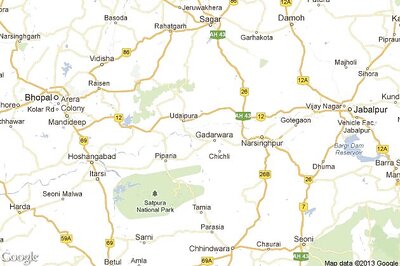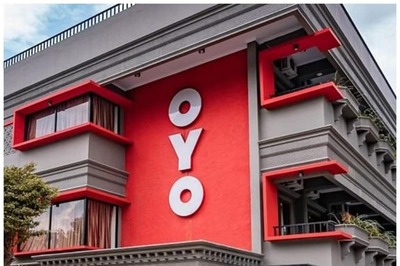
views
Baghdad: A suicide bomber attacked a crowd of people waiting outside a heavily guarded court building in Baghdad on Thursday, killing 10 Iraqis and wounding 47, police said.
All were civilians except two policemen who were wounded, police added.
Police first said the attack was caused by a car bomb targeting a three-car police convoy in the area, but later said it was caused by a man with explosives hidden beneath his clothing.
The man set them off in a crowd of police officers and civilians waiting outside the civil court, said police Lt Thair Mahmoud.
The officers were guarding the building and many of the civilians were meeting just outside it with paralegals writing the petitions the civilians planned to submit to the court.
Firefighters in yellow helmets rushed to the scene and were using hoses to clean blood stains from the sidewalk and street outside the court.
In other attacks Thursday, three drive-by shootings in Baghdad killed army Brig Mohammed Ridha Abdul-Karim, a civilian, and a driver for Iraq's human rights ministry, police said.
Iraq's Interior Ministry also updated the number of Iraqis whose bullet-ridden bodies were found in the country on Wednesday to 43, many of them in the capital.
They were apparent victims of death squads that kidnap civilians of rival Muslim sects, torture them, and dump their bodies.
Lately, Iraq's violence has shifted mainly from attacks by insurgents on US and Iraqi forces to carefully targeted murders of Iraqi. Such sectarian violence by death squads targeting Shiite and Sunni civilians sharply increased after the February 22 bombing of a Shiite shrine in Samarra, a city 95 kilometers (60 miles) north of Baghdad.
Sunni-led insurgents also have been boldly attacking fellow Sunni Arabs who cooperate with the US-backed Iraqi government by joining Iraq's military or its police forces.
On Wednesday, a suicide bomber cloaked in explosives killed two policemen and 13 police recruits gathered in Fallujah, a city surrounded by US Marine checkpoints. In a nearby town, three newly recruited Sunni soldiers from the US-trained Iraqi army were found slain.
PAGE_BREAK
The suicide attack outside the main police station in Fallujah occurred a day after the governor of Anbar province, which includes Fallujah, narrowly escaped assassination.
A suicide bomber exploded his vehicle near Maamoun Sami Rashid al-Alwani's convoy in Ramadi, killing 10 people. The governor was not injured, US officials said.
US and Iraqi officials have been urging Sunni Arabs to join the police and army, which has been dominated by the rival Shiite Muslim sect and ethnic Kurds.
Sunni community leaders say the presence of Shiite and Kurdish troops in their areas raises sectarian tensions and undermines confidence in the government.
Training and recruiting Sunni Arab police and soldiers is part of a broader strategy by US and Iraqi authorities to establish a political role for selected Sunni insurgent groups.
The goal is to split more moderate elements from the Saddam Hussein's fanatic loyalists and extremists such as al-Qaeda in Iraq, led by Abu Musab al-Zarqawi.
Last weekend, President Jalal Talabani said officials from his office met with insurgent representatives and he was hopeful about a deal.
US officials also acknowledge contacts with Sunnis who have ties to the insurgency. But American diplomats have not confirmed a report this week in a leading Arabic newspaper, Asharq Al-Awsat, that said US Ambassador Zalmay Khalilzad had met seven times since Jan. 16 with representatives of 10 major insurgent groups.
''Negotiations with armed groups will reduce violence'' and ''alienate the terrorists,'' Talabani's security adviser, Lt Gen Wafiq al-Samarraie, said Wednesday on Iraqi state television.
''Consequently, no one will be able to say 'we are resistance groups,' only that they are foreigners, kidnappers and groups that carry out kidnappings, robberies and killings.''
Meanwhile, the formation of Iraq's new government continues.
Prime Minister-designate Nouri al-Maliki, a Shiite, has said he intends to finish appointing his Cabinet by late next week.
To do that, he must balance the demands of the country's religiously and ethnically based parties for key posts, including the ministries of oil, defense and interior.
Ensuring all groups a stake in the new government may require the Shiites, who hold 130 of the 275 seats in parliament, to give minority Sunni Arabs and Kurds more posts than they would expect based on their showing in the December 15 legislative elections.



















Comments
0 comment